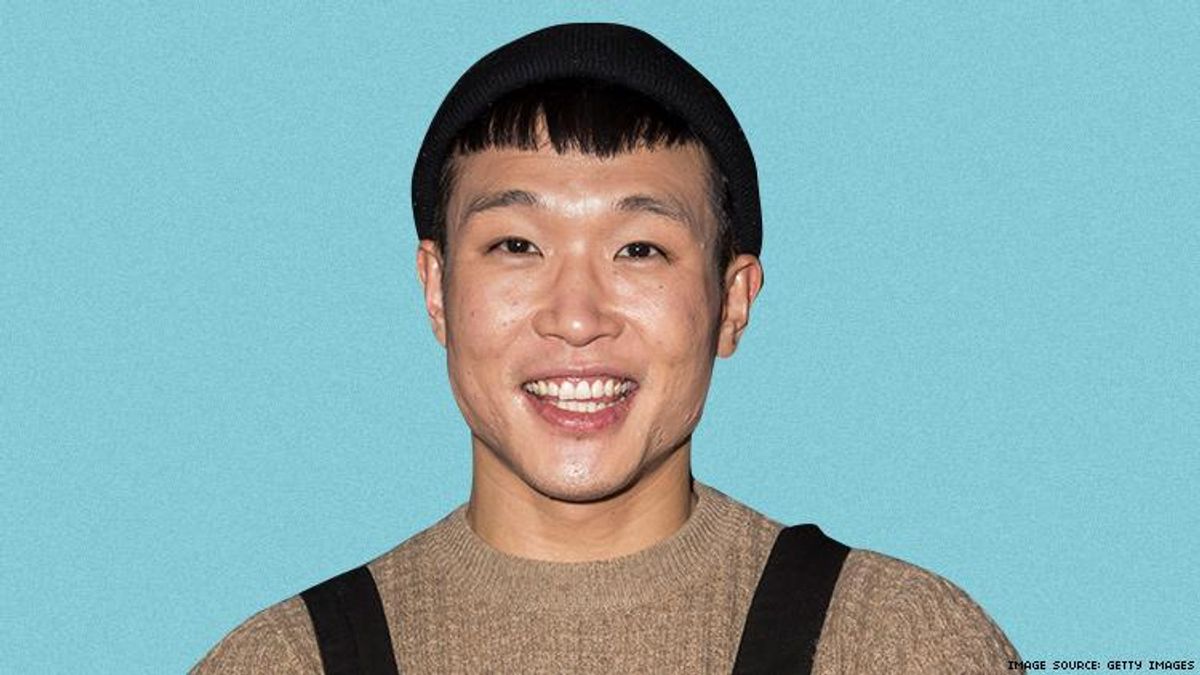Joel Kim Booster doesn't care if you don't like him; he doesn't care if you don't want to sleep with him.
"There are a lot of reasons not to be attracted to me," he says, but don't make it about his race. In Los Angeles, where he now lives, Joel sees "No Asians" on dating apps every day. And it has inspired a lot of the comedian's jokes, as have other stigmas and stereotypes about being Asian, but he also describes it as a real weight that he carries.
On this week's episode of The Advocate's podcast, LGBTQ&A, Joel Kim Booster talks about how we can make Grindr a friendlier place, writing authentic queer characters on the TV show, The Other Two, and his complicated relationship to his penis.
Read highlights from the interview here, subscribe on your favorite podcast app, or listen to the full interview on the audio player below.
On men who say they're not attracted to Asian people:
You can not find me attractive, but to make that assumption about an entire race of people... the inherent assumption in "I'm not attracted to Asian men" is that we all look the same or there's an innate quality about Asian men that you cannot separate.
Let's be real, that's the thing behind "No Asians". Saying "I like a guy with a big dick who's masculine, who's muscular, who's XYZ." All of the things that are not associated with Asian men typically in terms of the stereotypes we see in the media and elsewhere. But there are Asian men that exist who would check those boxes.
On his weird relationship to his penis:
I feel this weird relationship to my dick. I love my penis. It is great and gorgeous, but there is this moment every time before I whip it out that I think, "Am I the first Asian penis that this person is going to see in a hookup? Am I gonna measure up? Is this going to meet expectations Fall below expectations?" And having that will truly drive you nuts.
It's a real weight and I didn't realize I was carrying it so heavily until I was in Asia for the first time and walking around and realizing, "Oh my god, I'm just another face. I'm just another person in this crowd." It was so nice to just blend in and feel a little more invisible in a way.
On feeling separate from the gay community because of his race:
I understand where those people are coming from when they're like, "I don't feel accepted. I don't feel safe. I don't feel respected in those spaces." I fully get that because I'm there and I'm dancing and I'm good. And sometimes you interact with someone whose entire view of your self-worth is wrapped up in fuckability.
No matter how I force my body into a shape that's more in the zeitgeist of gay male desire, I will always be a little bit apart from that world because of my race and because of perceptions about my race. And I've accepted it, but it is tough sometimes to be introduced to somebody and just have them look through you and you know exactly why. It's because they're not attracted to you.
I'm not attracted to everybody that I meet on a fucking dance floor, but I still am able to treat people I'm not attracted to with respect and humanity.
On making Grindr a healthier environment:
I think we should all be interrogating our desires a little bit more...Maybe take an extra step sometimes to think about that. And just as a general note, we have 400 characters on Grindr, maybe just list the things you like. It just makes it a healthier environment for all of us to exist in rather than just seeing it at the forefront, the "I don't like you," which is tough.
On writing complicated queer characters in The Other Two:
In an early episode, one of our leads has that moment of, "Oh, you're gay? I didn't know that." And he voices, "Thank you." We talked a lot about that experience in the room because the room was largely gay men and we all had experience of either desiring that as young people or having that happen to us and having the internal "thank you".
We all sort of want to pass in a way or wanted to pass at some point in our lives. It was really important for us to have the other gay character onscreen say, "That's fucked up," to voice that.
Subscribe and listen to the full podcast interview on LGBTQ&A.


















































































